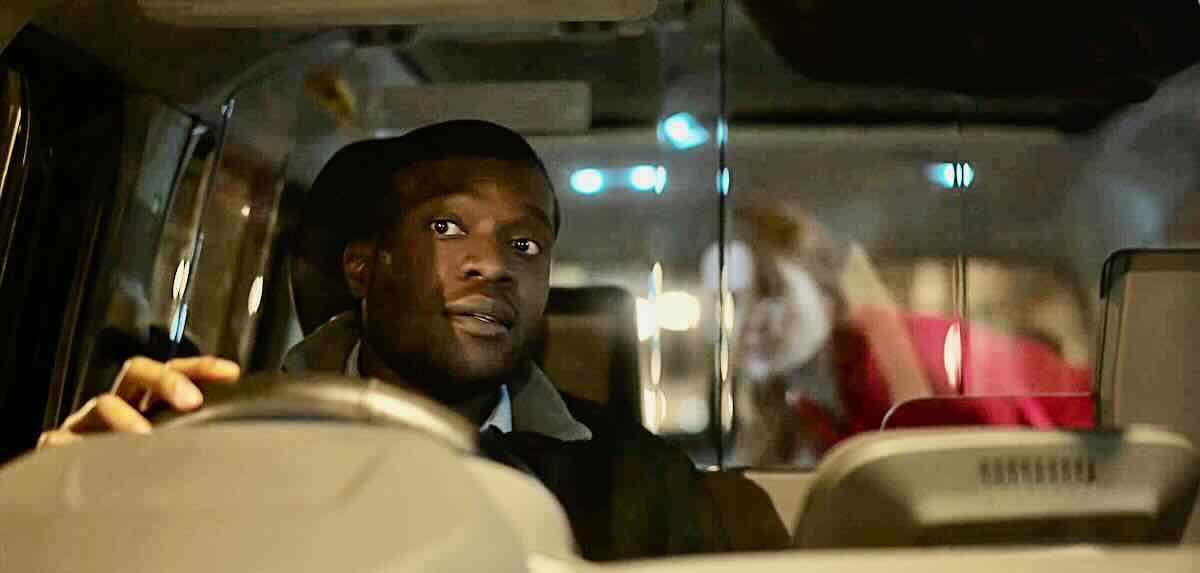
Eddie Carter only drives his cab during the wee, small hours. He’s keyed into the London night culture: many of his riders are regulars, and he knows the street people. One night, Eddie pulls over to nap in the park. When he awakes, a corpse is in the street in front of him, that of a beautiful sex worker, bound and gagged and murdered. Eddie reports the crime.
But no mention of it appears in the press. Eddie becomes obsessed with the incident. After being rebuffed by an investigative reporter friend, he takes it upon himself to track the crime. He sets up a board with photos, string, and Post-its. He questions people who might know the victim. He’s so into it that he eventually begins to hallucinate her.
Midnight Taxi draws us in with its crisp cinematography and its propulsive score. London at night has rarely looked so good. In an early scene, Eddie’s old pal Trevor entices him to give up the independent gig—Eddie owns his vehicle—and join his fleet. He suggests that “the slow but inevitable death of the taxi industry” is a dead end; Eddie replies that “this lifestyle is enough for me.” This conversation seems to set us up for some probing issues. Sadly, none of this comes to fruition. Midnight Taxi opts for the more generic and episodic.
Eddie’s nocturnal fares range from benign to sinister. A hoodlum stiffs him on his ride and then threatens him with a knife when confronted. A beautiful woman strips down and changes from business attire into a clubbing dress in the backseat. Eddie routinely waits for Rachel, with whom he has a strong connection. And all through, clues are periodically presented that add to the dead girl mystery.
Which makes Midnight Taxi a bit of a slog. We check our watch almost halfway through: plot strands that should be tightening are slack. We’re meant to ask ourselves: are the steps we see Eddie taking as purely intended as they seem? Or is Eddie’s aversion to the police an admission of guilt?
Maybe the filmmakers, Bertie Speirs and Samantha Speirs, don’t know what they’re getting at. The Speirs have quite an impressive resumé, independent shorts, and production work for Marvel movies. This is their first writer/director credit. They’re ambitious, give them that. Midnight Taxi was shot during the pandemic. However, the compromises they made show through plot holes, padding, and a strong reliance on a score by Jake Bradford-Sharp that becomes more aggressive as the film goes on, implying an urgency not evident on the screen.
Which is too bad, given the talent at their disposal. The bracing view of London by Bertie Speirs (the cinematographer as well) has already been mentioned. The actors comport themselves well. Ladi Emeruwa as Eddie holds our attention in his quest. Other standouts include Charlotte Price as Rachel and Eddie Eyre as Trevor.
Despite those strong performances, Midnight Taxi is oddly underpopulated. This is London, for godsakes, one of the most vibrant cities in the world. Yet there are few people on the street, and they all seem to know each other. Characters start to look alike or become indistinguishable in their roles. Is this vacantness a symptom of shooting during COVID-19? If so, why tell this particular story when hampered by those particular events?
The most intriguing aspect is the recurrent screech of a fox that’s wandered out of the park. The animal becomes symbolic of Eddie’s quest, bleating because it’s lost or displaced, which could serve as a mantra for this entire production.
___________________________________________
Midnight Taxi. Directed by Bertie Speirs and Samantha Speirs. 2024. From Little Nipper Productions. 97 minutes.
